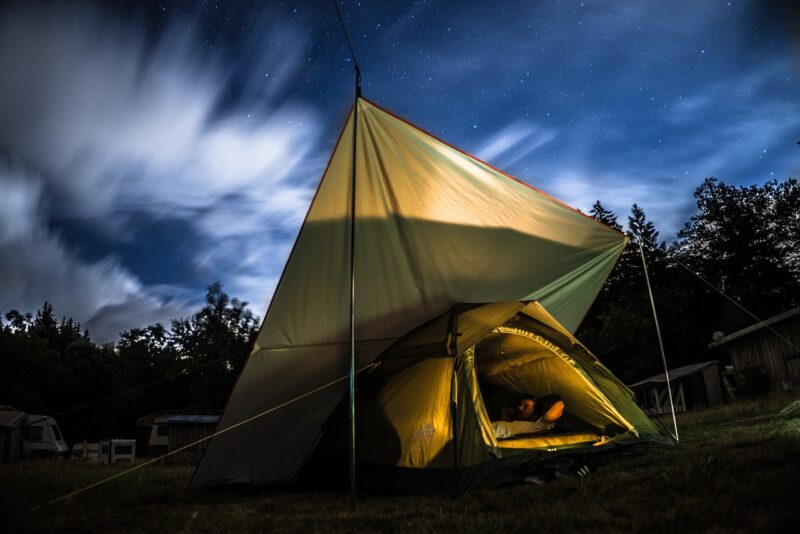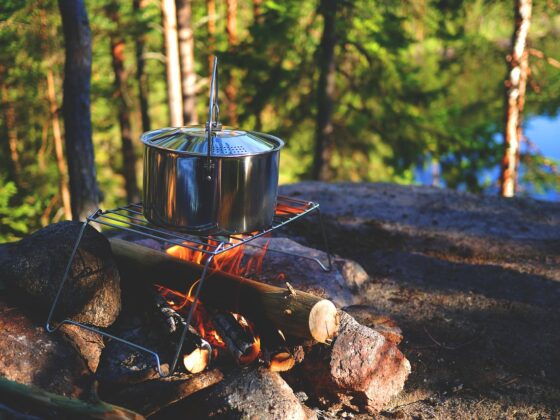Camping is an experience that everyone should have at least once in their lifetime. There’s nothing quite like spending time in nature, breathing in the fresh air, and sleeping under the stars. However, setting up your tent and ensuring it is secure and a comfortable place to sleep in can be daunting, especially if you’re a first-time camper.
That’s why we’ve put together the ultimate guide to help you secure your tent and sleep soundly in the great outdoors. In this guide, we’ll share 10 foolproof ways to make sure your tent is secure and comfortable to sleep in. From choosing the right spot to pitching your tent properly, we’ve got you covered. So, whether you’re a seasoned camper or a beginner, read on to discover our top tips for a comfortable and worry-free camping experience.
TIP 1: Invest in Good Gear
One of the most important things you can do to ensure a successful camping trip is to invest in good gear. This includes a high-quality tent, sleeping bags, and sleeping pads. When it comes to tents, look for one that is sturdy, waterproof, and easy to set up. You don’t want to be struggling with a complicated tent in the middle of the night. Make sure your sleeping bags are warm enough for the temperatures you’ll be facing and that your sleeping pads are comfortable enough for a good night’s sleep. Good gear doesn’t necessarily mean expensive gear, but it’s worth spending a little extra to get gear that will last for years to come.
Another important piece of gear is a tarp. A tarp can be used to cover the ground underneath your tent, providing an extra layer of protection against moisture. It can also be used as a shelter in case of rain or as a windbreak to keep your campsite comfortable.
When it comes to camping gear, it’s always better to be over-prepared than under-prepared. Make a checklist of everything you need and double-check it before you leave for your trip.
TIP 2: Choose the Right Spot
Choosing the right spot for your tent is crucial for a comfortable and safe camping experience. Look for a level, debris-free, and well-drained spot. Ensure that the area is sheltered from the wind and protected from potential hazards like falling branches or rock slides. Avoid camping near rivers or streams to prevent flash floods. Also, consider the sun’s position and orient your tent in a way that the door faces away from the rising sun to avoid being woken up by the sun’s rays.
TIP 3: Pitch Your Tent Properly
Pitching your tent properly is crucial for a secure and comfortable night’s sleep. It is recommended to follow the instructions that came with your tent and practice setting it up at home before leaving for your trip. When pitching your tent, make sure to stake it down properly with stakes appropriate for the ground you’re camping on. If the ground is rocky or hard-packed, use alternative methods such as tying your tent to nearby trees or using rocks to weigh it down. Finally, make sure your rainfly is securely attached to keep you dry in case of rain. Check for gaps between the rainfly and the tent body to prevent moisture from seeping in
TIP 4: Choose Your Campsite Carefully
When camping, prioritize safety and comfort by choosing the right site. Opt for established campsites with designated areas for tents and fire pits. This reduces your impact on the environment and minimizes potential hazards.
Also, make sure to follow Leave No Trace principles when camping. This means packing out all your trash, using established fire pits, and avoiding damaging the local flora and fauna.
TIP 5: Stash Your Valuables
When camping, secure your valuables by keeping them with you at all times, either in a locked car or in your tent. Lock up your valuables if you’re leaving your campsite, using a lockbox, or storing them in a locked car trunk. Don’t leave them out in the open to avoid theft. Consider bringing a portable safe or locking storage container for added security, especially when sleeping or away from your campsite.
TIP 6: Avoid Bright-Colored Tents
Brightly colored tents may be trendy, but they can attract unwanted attention from wildlife. Stick to more muted colors, such as green or brown, to avoid any unwanted visitors, such as wild animals or insects.Keeping your campsite clean and free of food scraps and other attractants is also important. Store your food in a secure container, such as a bear canister, and dispose of any trash properly.
TIP 7: Know Where Your Toilet Is
When you’re camping, it’s important to know where the nearest toilet is. This can be a designated campground restroom or a portable toilet that you bring with you. Make sure to use the toilet properly and follow any posted rules or regulations.Also, make sure to bring hand sanitizer and/or soap with you to keep your hands clean.
TIP 8: Use Ear Plugs
To minimize noise disruptions during camping, wear earplugs to block out unwanted noise for a more restful sleep. Choose a campsite far from busy roads or noise sources. If camping with a group, establish quiet hours to ensure everyone gets a good night’s sleep.
TIP 9: Use an Alarm
When camping, use an alarm to avoid sleeping in too late. Set it early enough to allow for packing up and hitting the trail without feeling rushed. Choose a traditional alarm clock or a smartphone app to ensure you wake up on time and enjoy your last morning in the great outdoors.
TIP 10: Open the Vents
To ensure a comfortable camping experience, keep your tent properly ventilated to prevent condensation build-up. Open the vents on your tent, even if it’s cold outside, to circulate air and avoid a stuffy feeling. Additionally, when setting up your tent, consider the weather conditions. Choose a shady spot if it’s going to be hot outside, or a wind-protected location if it’s going to be cold. This will help you stay comfortable throughout your camping trip.
By following these 10 foolproof tips, you’ll be able to secure your tent and sleep soundly in the great outdoors. Remember to invest in good gear, choose the right spot, pitch your tent properly, and follow Leave No Trace principles. With a little preparation and planning, you’ll be able to enjoy a comfortable and worry-free camping experience.


